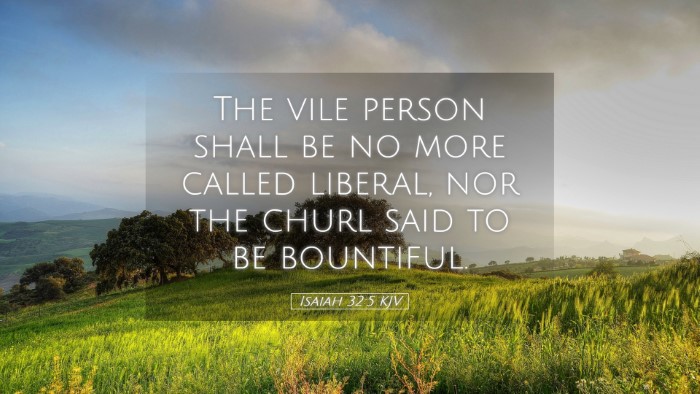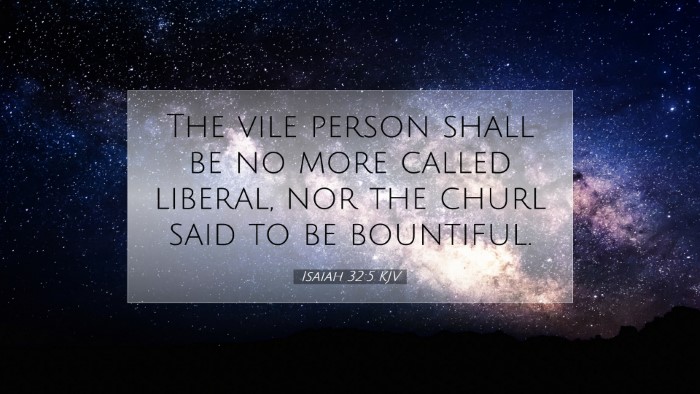Bible Commentary on Isaiah 32:5
Verse: "The vile person shall be no more called liberal, nor the churl said to be bountiful."
Introduction
This verse from the Book of Isaiah serves as a powerful statement about divine judgment and moral transformation. Isaiah, a prophetic voice in ancient Israel, articulates a coming era where the distinctions between the righteous and the wicked are clearly defined. The implications of this prophecy extend not only to the immediate context of the Israelites but also to contemporary understanding of morality and leadership.
Contextual Analysis
Historical Background: The time of Isaiah was marked by political turmoil and moral decay within both Israel and Judah. The people faced external threats from surrounding nations, while internally, leaders often engaged in practices that undermined justice and equity. Isaiah's role was to call them back to a covenant relationship with God.
Theological Themes: This verse reflects significant theological themes: divine justice, the nature of true leadership, and the moral order within society. It emphasizes that societal values will be inverted and moral clarity will eventually be restored.
Commentary Insights
Matthew Henry’s Commentary
Matthew Henry notes that the "vile person" refers to those whose actions and character are far from the divine standard. They are often mistaken for being generous or noble, especially in a society where moral ambiguity reigns. This prophetic promise indicates a reversal of such perceptions; the righteous will be recognized for their true worth, while the vile will no longer be able to masquerade as good. Henry highlights that this transformation will be part of God's broader plan to establish His righteousness in the earth.
Albert Barnes’ Analysis
Albert Barnes emphasizes the importance of the terms used in this verse. He elaborates that "liberal" is associated with generosity while "bountiful" elucidates a sense of abundance. Yet, Barnes argues that these terms have been misapplied to those who do not live by God's standards. The reference to the "churl" – a misanthrope or a stingy person – underlines the hypocrisy in social values. Barnes opines that the sincere action of generosity is rooted in righteousness and not merely in superficial acts of giving. He also points out that in the new order described by Isaiah, the true nature of individuals will be laid bare, leading to a restoration of righteousness.
Adam Clarke’s Observations
Adam Clarke provides a linguistically rich interpretation of the original Hebrew text. He points out that the "vile person" (from the Hebrew wicked) relates closely to the context of a person being shameful or disgraceful. Clarke suggests that the prophetic word indicates a time coming when the wicked will no longer receive social esteem but will be publicly condemned for their actions. He draws a connection between this verse and the future kingdom where moral integrity will be upheld. Clarke stresses the impetus for believers to live righteously in anticipation of this era.
Theological Implications
- Morality and Recognition: This verse challenges the readers to reflect on societal standards of valuing individuals. It sets forth a divine criterion that distinguishes the true nature of a person irrespective of their status or apparent acts of kindness.
- Hope in Restoration: For theologians, Isaiah 32:5 is a beacon of hope, affirming that God's justice will ultimately prevail. It reassures believers that despite the current state of immoral leadership and society, God has a plan for restoration.
- Ethical Leadership: Pastors can draw valuable lessons on the ethics of leadership, emphasizing the necessity of character that aligns with God's teachings. This requires a commitment to authenticity over appearance.
Conclusion
In Isaiah 32:5, we find a profound commentary on the nature of society and divine justice. This verse acts as a relational mirror for both the ancient readers and contemporary audiences. By shedding light on the misconceptions and moral failures of the time, Isaiah calls for a realignment of values in accordance with God's righteousness. The insights drawn from the commentaries of Matthew Henry, Albert Barnes, and Adam Clarke underline the call for integrity and the ultimate hope found in God's transformative power.
This commentary serves as a reminder that true evaluation comes from God, and the last judgment will reveal the hidden nature of individuals, urging all to live in accordance with His standards.


